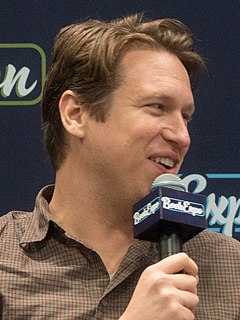A Quote by Byron Katie
When you question what you believe, you leave the world, really, and what the world believes. It puts you in a very interesting position.
Related Quotes
That it does not matter what a man believes is a statement heard on every side today. ... What he believes tells him what the world is for. How can men who disagree about what the world is for agree about any of the minutiae of daily conduct? The statement really means that it does not matter what a man believes so long as he does not take his beliefs seriously.
A person who believes that Elvis is still alive is very unlikely to get promoted to a position of great power and responsibility in our society. Neither will a person who believes that the holocaust was a hoax. But people who believe equally irrational things about God and the bible are now running our country. This is genuinely terrifying.
How can this strange story of God made flesh, of a crucified Savior, of resurrection and new creation become credible for those whose entire mental training has conditioned them to believe that the real world is the world which can be satisfactorily explained and managed without the hypothesis of God? I know of only one clue to the answering of that question, only one real hermeneutic of the gospel: a congregation which believes it.
There's no question that how Johannesburg operates is what made me interested in the idea of wealth discrepancy. 'Elysium' could be a metaphor for just Jo'burg, but it's also a metaphor for the Third World and the First World. And in science fiction, separation of wealth is a really interesting idea to mess with.
Anger makes people feel uncomfortable, because the minute somebody shows it, it puts you in a position where you can't laugh or make light of something... not to trivialise it I don't mean. But your reaction to anger is supposed to be fear or returned anger. So, you're really trying to control a situation when you show anger and it's a very weak position to take. It often works on people who aren't in a position to fight back.
Why one writes is a question I can answer easily, having so often asked it of myself. I believe one writes because one has to create a world in which one can live. I could not live in any of the worlds offered to me - the world of my parents, the world of war, the world of politics. I had to create a world of my own, like a climate, a country, an atmosphere in which I could breathe, reign, and recreate myself when destroyed by living. That, I believe, is the reason for every work of art.



































